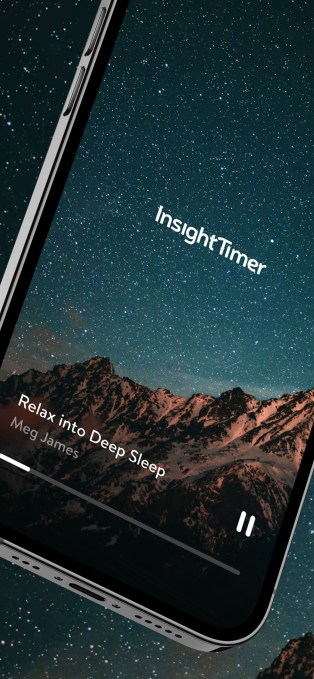[ad_1]
CEO of Meditation App Insight Timer, Christopher Plowman is disappointed. They don’t think teachers who leverage their app’s marketplace to reach their students have to share 30% of their income with Apple — its commission on in-app purchases — and for the last 12 months, Apple also agreed. After Apple loosened its rules around in-app donations in 2022, Insight Timer took advantage of the option to accommodate a digital donations feature, which allowed Insight Timer teachers to receive “tips” from their user profiles and during live events. “Permitted to collect. Apple reviewed the app and approved its release on the App Store. Now the tech giant has changed its mind — it wants to collect commissions from this content, and Insight Timer had no choice but to comply or shut down its iOS business, Plowman says.
The issue here is somewhat complex, but highlights the challenges developers face in navigating today’s App Store and its growing set of rules, which are often open to misinterpretation by both app makers and Apple’s app reviewers. Are there. Instead of adding a representative to work with a subset of Apple’s developer clients — app creators who help Apple makes huge profits from its services division -Apple’s app review is often a hit-or-miss process where a rogue reviewer can reinterpret Apple’s policy differently from others, upsetting the developer’s entire business in the process.
That’s what happened with Insight Timer, a popular meditation app with nearly 25 million installs and 3 million monthly active users. Like many App Store businesses, Insight Timer generates revenue by selling subscriptions. In 2023, it earned approximately $20 million in subscription revenue, of which one third (30%) was paid to Apple according to its commission guidelines.
However, the company also offers a donation feature that allows customers to tip their favorite meditation teachers to thank them for their time and effort.
“Our teachers are very engaged with our community. They spend a lot of time answering questions, recording video answers and audio answers and things like that,” explains Plowman. When Apple added a new rule regarding donations, the CEO realized he could take advantage of the option to help supplement teachers’ income with larger digital tips. Because Insight Timer does not deduct users’ donations to Preferred Educators, those donations should not be subject to Apple’s commission – or so Plowman believed.

Image Credit: Insight Timer
in Section 3.2.1 of Apple’s App Review GuidelinesThe company states that apps can revolve around Apple’s in-app purchases if they enable individual users to “give a monetary gift to another person” and have “100% of the funds” go to the gift recipient. Insight Timer took advantage of this option to allow its users to tip meditation teachers, therapists, musicians, and others who use its app to teach classes on meditation, stress management, happiness or finding spiritual enlightenment, etc. We do. As regulations allow, Insight Timer implemented the feature using Stripe as the payment provider on the back end.
Users may choose to donate funds to the teacher, but are not required to do so. Insight Timer’s core business is selling premium subscriptions to its app, which offer additional features like offline listening, journaling, and unlimited access to its courses. Fifty percent of this revenue is shared with the teachers, so they do not have to depend on donations for their work. Plowman says that during the time the commission-free donation feature was live, Insight Timer users donated about $100,000 per month to the app’s teachers.
It appears that Apple has blessed this use case, as the tech giant approved 47 more updates to Insight Timer’s app during a 12-month period. When a question arose, Insight Timer explained that these were donations – it would not take a cut of that revenue – and that Apple would approve the app.

Image Credit: Insight Timer
Late last year, those approvals stopped. An app reviewer told Insight Timer that these donations were no longer considered monetary gifts – they were now “digital content”. This meant that they too were now subject to Apple’s commission. This decision doesn’t hurt Insight Timer’s bottom line, as the app’s core business is subscriptions. Instead, it harms the community of teachers who raise additional funds through users’ donations. Now, Apple is demanding 30% of that revenue, so teachers are taking a 30% pay cut overnight.
Plowman says he went back and forth with Apple over the feature, trying to understand why Apple had previously allowed a donation option – 47 times! – Was now under commission. Apple compromised and said it would allow links to donations on teachers’ profiles subject to its commission-free rules, but all other donations – from live events, to the meditations themselves – would have to be commissioned. It will also not allow those links to point to donation links on teachers’ profiles.
“And I said, well, what’s the point of building an ice cream stand across the street if you’re not going to let customers cross the street to buy ice cream?” Plowman argued.
In the end, both sides did not reach any kind of solution. Plowman was given until February to comply with Apple’s decision, otherwise his business would be barred from the App Store.
He expressed his disappointment this week a linkedin post Where he’s asking for change from Apple’s leadership, but without the vitriol common to Apple’s critics like Epic Games and Spotify when they argue against the App Store’s commission structure.
“So finally, I agreed,” Plowman told TechCrunch in an interview. “I don’t want to pick a fight with Apple – I don’t want to pick a fight with Apple. I think this problem is largely due to regulators not intervening. Apple is a public company, but it has shareholders – it’s doing what it’s allowed to do,” he says.
Plus, Plowman says, his company has 100 employees. There are investors in it. (It has raised nearly $30 million over the past 10 years develop enterprises, Altos VenturesAnd this Bridge Builders Collaborative.) He has no choice but to comply.
Plowman believes the issue of variation in Apple’s interpretation of its rules is one of the problems with the current commission model.
More broadly, Apple’s rules are vague about what does or does not constitute digital content.
“If I’m a teacher, conducting a workshop while sitting in front of a computer screen, those are my billable hours. It’s like an Uber driver giving someone a lift or someone renting out their house,” he said. Apple told them that if the monetary gift is a one-to-one donation, it is commission-free, but once the teacher runs a workshop with at least two people, it becomes commissionable “digital content.” Is.
“Apple says iPhone users and App Store users are Apple customers. And, quite fairly, we can say that. And on that basis, [Apple] Plowman says he is entitled to take commission when it makes sense. “But in that case, why don’t companies like Airbnb and Uber pay Apple anything? , , , If I’m a teacher on Insight Timer. , , Why do I have to pay a 30% fee?” he asks.
Apple has not responded to a request for comment at this time.
[ad_2]
Thanks For Reading

